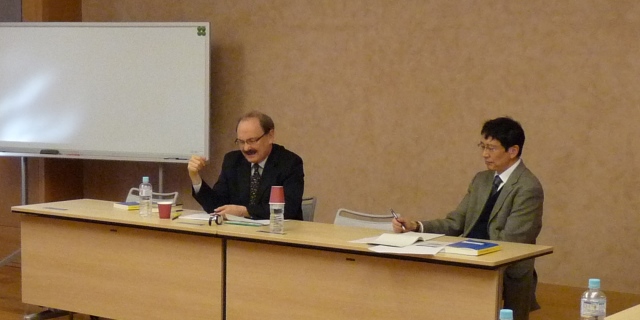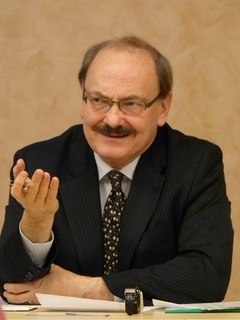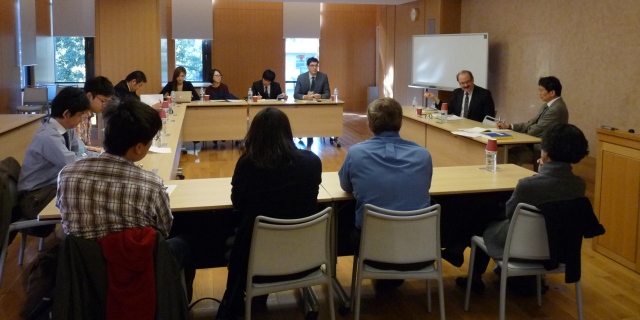SSU Forum with Dr. Kent Calder
| Date: | November 27, 2013 |
|---|---|
| Subject: | “The New Continentalism: Energy and Twenty-First Century Eurasian Geopolitics” |
| Lecture: | Dr. Kent Calder, Director of the Edwin O. Reischauer Center for East Asian Studies, SAIS |
| Language: | English |
Professor Kent Calder, director of the Edwin O. Reischauer Center for East Asian Studies and director of the Japan Studies Program at the Paul H. Nitze School of Advanced International Studies (SAIS), very kindly delivered a talk at the Policy Alternatives Research Institute (PARI) focusing on the idea of “new continentalism” in the Eurasian landmass, both as a driving force of contemporary East Asian dynamics, and as a framework for intellectual analysis. The talk reflected his latest book, which bears the title The New Continentalism: Energy and Twenty-First-Century Eurasian Geopolitics (Yale University Press, 2012).

Professor Keisuke Iida has presented Professor Calder to the audience as an author who needs no introduction, due to the prominence of his publication record, thanking him for his visit to the PARI.

Professor Calder has opened his speech by considering the emergence of a series of empirical observations in the political and economic landscape of Eurasia, which need to be addressed by IR scholars, especially the vast and rapid transformation of Asia, the construction of numerous transport infrastructures leading to the shaping of continental networks, and the consequent political ties developing from this relatively new reality. All this is also related to a broader historical frame which Professor Calder relates back to the transformation of Asia through several critical (pivotal) events, such as the start of economic reforms in China after 1978, the Iranian revolution of 1979, the opening up of India in 1991 and the collapse of the Soviet Union in the same year.
Empirical evidence appears to be mounting in support of this analysis of Eurasian politics. Not only pipelines and high speed trains projects across borders are rapidly growing in number, but also in diplomatic terms it is possible to observe an unprecedented vitality. Chinese President Xi Jinping has paid already two visits to his Russian counterpart, and appears to be focused on a strategy of increasing ties with the former Soviet republics in central Asia. Russian President Vladimir Putin has shifted the focus of his foreign policy during the current third mandate decisively towards East. Also the South Korean government has appeared strongly interested in the creation of ties with the rest of the Asian continent, both diplomatic and economic.
Professor Calder made it clear that the variety of regionalism we are currently witnessing in Eurasia is not of the same kind to be historically observed within the European Union, but it is much thinner and precarious. Nevertheless, dealing with the great diversity not only of different national realities, but even of sub-national and local politico-economic entities, Professor Calder's reflection of the new Eurasian “continentalism” is premised on the idea that “continents matter”, namely on a classical geopolitical concept which has been already at the very centre of Mackinder's work. His description of this emerging continental arrangement leans towards considering the complementarity between different economies as the key driving factor. In this new context, not only Iran's centrality has to be underscored once more, but the geopolitical importance of so far less relevant countries is likely to grow, particularly in the cases of Myanmar, India, Bangladesh and Vietnam.
This Eurasian shift has been apparent for Japan as well, but only partially, Professor Calder has argued. While Shinzo Abe's government has increased its dialogue with Russia, in the context of the emerging new continentalism Japan appears to be “in a different place”, and it will be important for its foreign policy makers in all sub-fields to grasp the meaning of the current changing status quo on the Eurasian landmass and, and to adjust consequently.

-
Johns Hopkins School of Advanced International Studies - SAIS
